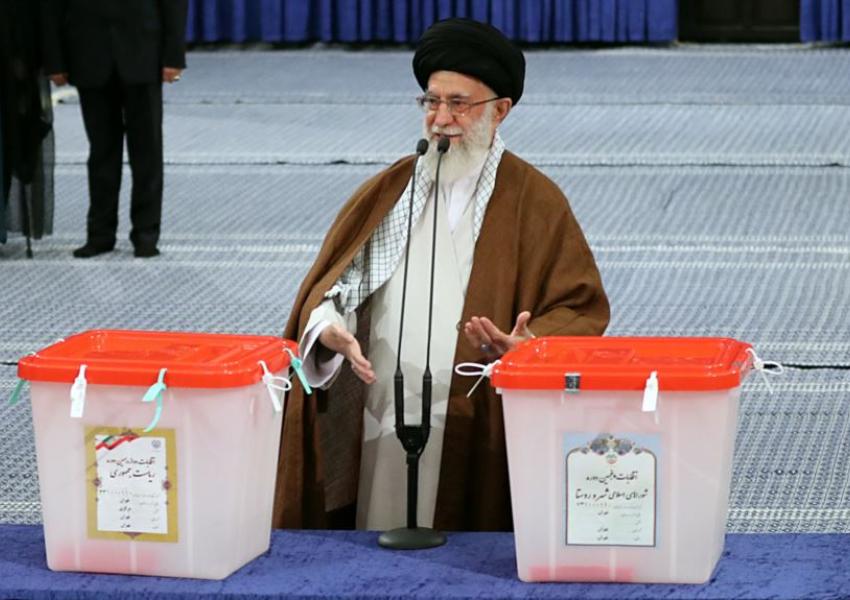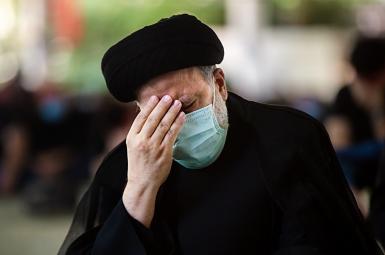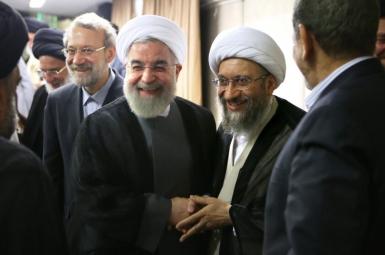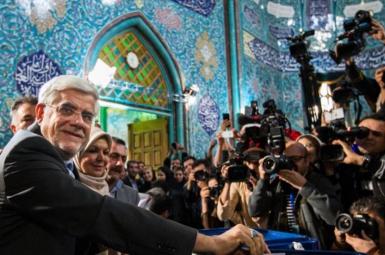
Will Iran's Weakened Reformists Field A Presidential Candidate In 2021?
After more than three years of silence and inaction that brought criticism and disgrace for the reform camp, prominent reformist figures seem to have started an onslaught in the press in preparation for the 2021 presidential elections.
Mohammad Khoiniha, the cleric who masterminded the seizure of the US embassy in 1979 and headed the left-wing clerical association for more than two decades re-emerged on the political scene after several years with two letters. In late June he warned the Iranian Supreme Leader Ali Khamenei about the fading of his regime's legitimacy and growing distrust of state officials among the people.
Khoiniha wrote another open letter on September 24 warning the people and officials that "ignoring the importance of the upcoming presidential elections will make the country's chaotic economic, political and social situation even worse." Expressing his concern about the low turnout in the parliament (Majles) election in February, he was fair enough to blame the behavior of some government institutions for the people's frustration and disillusionment.
Meanwhile, Abdolvahed Mousavi-Lari the former leader of the Reformists' Coordination Council who resigned his position in protest to reformist lawmakers' inaction in the previous Majles, told the official news agency IRNA on September 29 that the reform camp has been experiencing its most difficult days since early 2018 when he believes the people began to turn their back to the reformists.
This coincides with the first round of major nationwide protests during which people voiced their distrust of both leading political factions in Iran; Reformists and Conservatives.
Mousavi Lari admits that during the last four years the reformists lost a large part of their social capital. He attributed the loss to the poor performance of the Rouhani administration. Rouhani won both rounds of presidential elections in 2013 and 2017 thanks to the support from the reform camp.
Many others who have criticized the reform camp also blame Mohammad Reza Aref, the leader of the reform Hope faction in the former Majles who has been criticized by reformists, conservatives and other players as well as the man in the street for sitting at the Majles and doing nothing for years. Even many lawmakers who were in the same camp with Aref lashed out at him for his silence and inaction and stressed that he has ruined the reformists' future.
Aref, however, defended his silence for the first time in a September 30 interview with ISNA and said that he was not after personal gain and wanted to give an opportunity to his conservative rivals to have a say at the Majles! He also portrayed the Hope faction's presence at two Majles committees as achievements for reformists. However, his defense is unlikely to convince anyone in the reform camp. The fact that no one from the camp has reacted to Aref's resignation from his position as the chairman of the High Council of Reformists, is self-explanatory.
With this backdrop in mind, media reports indicate that the reform camp is still adamant to actively take part in the 2021 presidential elections.
But the question is if hardliners will allow a viable reformist candidate to run next year. All candidates must be approved by conservative-dominated Guardian Council. Even in case a reformist joins the race, would people participate in the elections? In February’s parliamentary elections and later by-elections turnout was much lower than 50 percent.
According to reformist daily Etemad on September 30, "It is hard to believe that three years ago some 24 million voters went to the polls and voted for Hassan Rouhani only because former reformist President Mohammad Khatami had asked them to do so."
In an article on the same day, Abdolkarim Hassanzadeh, the deputy chairman of the Hope Fraction and vice chairman of the former parliament's citizenship committee wrote that "Reformists who are part of the government, as well as reformist parties and proreform political figures in Iran and abroad have lost their credibility to a great extent."
However, he argued that manifestations of discontent and protests mean reforms have not stopped in their tracks.
But Hassanzadeh failed to mention the fact is that many protesters not only reject hardliners but also reformists, as repeated slogans have shown in the past three years.
Nonetheless, Hassanzadeh wrote that during the past two decades the reformists failed to bring about socio-economic justice, a strong middle class, an empowered civil society, free market economy and the culture of political participation.
He wrote the result was weakening of bonds between individuals in the society, a decline in the belief in social justice and a growth in distrust and pessimism and lack of confidence in political parties and figureheads.
Hassanzadeh blamed the prevailing nepotism among reformists, no change in the combination of party leaders and top officials within the reform camp and the presence of usual suspects [probably meaning Es'haq Jahangiri and Mohammad Reza Aref] as presidential candidates from the reform camp.
He also criticized Iranian reformists for not scrutinizing Rouhani's performance after they made him the country's president and even after Rouhani turned his back to 24 million people who had sent him to the presidential palace to follow their economic and political demands, describing this as the "biggest treason against democracy."
He concluded that 24 years after the birth of reform camp in Iran, reformists should determine and admit their own role in their own fading credibility.







